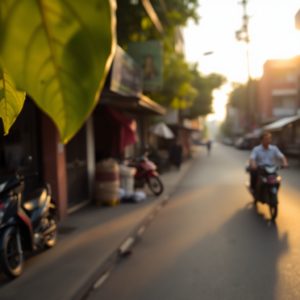Bangkok, Thailand — In a striking reversal of decades-old drug policy, Thailand has positioned itself at the forefront of a global kratom renaissance. Once criminalized and vilified, the indigenous plant Mitragyna speciosa—commonly known as kratom—is now the centerpiece of a national strategy to boost herbal exports, wellness tourism, and scientific innovation.
In 2025, the Thai government announced funding for 33 new kratom research and development projects. The National Herbal Medicines Policy Committee named kratom a “herb of the year,” alongside phlai and black ginger, signaling a strategic pivot toward traditional medicine as a pillar of economic growth.
According to the Bangkok Post:
The policy committee also approved a plan to promote herbs internationally to a sector that generated $137 billion in 2023, said [Public Health Minister Somsak Thepsutin], adding that Thailand generated at least $78 billion (58 billion baht) during the same period.
From Prohibition to Promotion
Kratom’s journey in Thailand is one of contradiction and resilience. Used for centuries in southern provinces as a stimulant and pain reliever, kratom was outlawed in 1943 under the Kratom Act—largely to protect opium tax revenues. It was later classified as a Schedule 5 narcotic in 1979, criminalizing its use despite widespread traditional consumption.
The tide began to turn in 2018 with limited legalization, culminating in full decriminalization in August 2021. This shift aligned with broader Southeast Asian trends toward decriminalizing traditional substances and reevaluating punitive drug laws. Today, kratom is sold openly—even in major supermarket chains like Big C.
A Scientific and Economic Pivot
Following decriminalization, Thailand’s Ministry of Higher Education, Science, Research and Innovation launched a wave of studies into kratom’s alkaloid profile, cultivation methods, and pharmacological effects. Universities such as Kasetsart, Mahidol, and Naresuan have received government backing to explore kratom’s therapeutic potential.
The 2022 Kratom Plant Act formalized this momentum, supporting research, trade, and product development. In 2023, the inaugural World Kratom Conference in Phuket underscored Thailand’s ambition to lead global kratom science. By 2025, the Thai FDA had raised the allowable mitragynine content in herbal products, reflecting confidence in domestic research.
Global Implications: Europe at a Crossroads
Thailand’s kratom revival is reverberating far beyond its borders—particularly in Europe, where the legal status of kratom remains a patchwork of contradictions. While countries like Austria and Albania allow kratom use, others such as Belgium and Sweden have banned it outright.
The European regulatory landscape is further complicated by the rise of synthetic kratom derivatives, especially 7-hydroxymitragynine (7-HMG). Unlike natural kratom, synthetic 7-HMG has been linked to opioid-like respiratory suppression, prompting public health concerns. Regulators across the EU are now grappling with how to distinguish between traditional kratom and its more potent, lab-altered counterparts.
At the Fourth International Kratom Symposium in 2025, experts warned that conflating natural kratom with synthetic extracts could lead to misguided bans and missed opportunities. “Synthetic 7-OH is not kratom—it is a highly potent, unregulated chemical,” said Dr. Paula Brown of the Scientific Association for Botanical Education and Research.
The Road Ahead
Thailand’s kratom policy is now a case study in how traditional knowledge, scientific research, and economic strategy can converge. But as the plant gains global traction, the challenge lies in ensuring that regulatory frameworks—especially in Europe—can keep pace with both innovation and safety.
For now, Thailand is betting big on kratom. Whether the rest of the world follows suit—or stumbles over regulatory hurdles—remains to be seen. But one thing is clear: the kratom conversation is no longer confined to the forests of southern Thailand. It’s gone global. And the world is watching.



